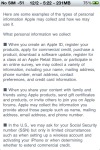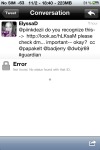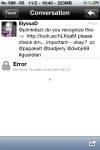By Jon Kelly BBC News Magazine
From shot 29-year-old Mark Duggan referring to the police as “feds” to the nuanced use of the word “community”, the language of the riots and the response can tell us something.
It may have been England that was shaken by violence, looting and disorder.
But many of the terms used by its perpetrators came from a very different place altogether – and, due to coverage of the rioting, they have found a wider audience than ever before.
“If you see a fed… SHOOT!” read one message circulated on BlackBerry Messenger, imploring readers to riot.
Another, widely reported in the aftermath of the chaos, urged everyone to “up and roll to Tottenham [expletive] the 5-0”. There were myriad references as well to the “po po”.
Mark Duggan, whose fatal shooting by police sparked the violence, himself sent a text message shortly before his death which read: “The feds are following me.”
Continue reading the main story
Slang for the police
- Slang terms for the police, often hostile and originated by criminals, go back a long time
- “Pig” was first used to mean police officer in 1811, the OED says
- “Peeler” was in use to refer to Irish constables by 1817 and was widely used for Robert Peel’s prototype force in 1829
- The “fuzz” is first recorded in the US in 1929
All these terms used to express antipathy towards the police share a common feature – all are derived from the inner cities of the US, not of the UK.
To outsiders, it appeared incongruous that these terms were commonly used by youngsters who were straight out of comprehensive, not Compton.
But when politicians and pundits used such terms to argue that the pernicious influence of hip hop and rap was responsible for fuelling the riots, they themselves ended up using vernacular gleaned from their box sets of The Wire.
When Michael Gove, the education secretary, discussed the possible causes of the disorder, he attacked the instant gratification of “gangsta” culture. Reporters transcribed the word as it might appear on the lyric sheet of a Dr Dre CD, instead of “gangster”, as once would have been expected when deployed by an Aberdonian Tory MP who represents a constituency in Surrey.
However, Jennifer Blake, a youth worker who runs the Safe and Sound anti-gang project in Peckham, south London, says such commentators miss the point.
 The Wire included terms “po-po” and “5-0”
The Wire included terms “po-po” and “5-0”
“When kids talk about the feds, it’s obvious that they’re not talking about the FBI,” she says. “They know that’s not how things work over here. It’s like a code – politicians and the media don’t understand.”
She highlights home-grown phrases like “bully van”, meaning police van, and “shank”, meaning knife, as evidence that UK street culture is not just passively replicating the language of the US inner cities.
Indeed, Jonathon Green, author of the Chambers Slang Dictionary, points out that many of the messages which circulated during the riots included non-US phrases.
These included exhortations to defend one’s “yard” – used in its Jamaican-derived sense, meaning home – or one’s “end”, a home-grown term referring to an area of a city.
Exclusive blend
All, he says, are examples of Multicultural London English (MLE), a dialect identified among young people in the capital which blends the phonetics and vocabulary of such diverse influences as West Indian, south Asian and traditional cockney.
He says the use of “feds” to mean the UK constabulary dates back no further than 1997, and the English deployment of “po po” – which originated in Los Angeles during the 1980s – is even more recent. Such Americanisms, Green says, have to be understood in this context, at least within London where the riots began.
 The Sopranos series regularly used the term “feds”
The Sopranos series regularly used the term “feds”
“It’s an ironical use,” he says. “Obviously there’s been an increased Americanisation of our language since the war, but MLE doesn’t just come from one source. It just so happens that rap music has lots of terms for the police.”
Of course, the language of hip hop and rap has been adopted far more widely than just among the inner city black youths who form its target audience.
Professor Gus John of the Institute of Education, University of London, has long worked with young people associated with gangs and has studied changes in language within England’s multi-ethnic communities. He argues that such terminology has the function of setting its users apart from the mainstream.
“It has its own resonance. It’s also exclusive, it becomes an internal language to people who share particular lifestyles. That’s part of its potency.
“The fact that it is internal, the fact it is not commonly used by everybody, helps to define the group.”
 Opponents of the rioters have their own terminology
Opponents of the rioters have their own terminology
Certainly, those who know little of hip hop culture, and would themselves reject violence and rioting, might have their own nicknames for the police, such as Old Bill or Peelers.
And among those attempting to speak for the majority appalled by the disorder, one word was regularly repeated.
Tottenham’s MP David Lammy spoke of “a mood of anxiety in the local community”. Sikhs who gathered in west London to guard against looters said they were “here to defend our temple and our community”. Richard Mannington Bowes, who died trying to prevent looting, was quickly hailed as a “hero of the community”.
The “community”, it appeared, was everything and everyone that did not include the rioters.
Indeed, the focus on “gangsta” terminology tells us just as much about the media as it does about the perpetrators of disorder, suggests lexicographer Susie Dent.
“I think journalists have adopted it because it distils the mood and the type of person perceived to be behind the past few days, and also because there’s been a distinct uncertainty, almost nervousness, about what to call the perpetrators,” she says.
“Are they rioters, which implies a political objection, looters, which doesn’t, or vandals, etc? It’s interesting too that a lot of the people cleaning up embraced the Sun’s ‘scum’ so readily, a reflexive response of anger.”
Whether it comes from the criminals themselves or the law-abiding majority, the words used to describe England’s riots tells us much about the society that produced them.
What is becoming increasingly clear is that far more than language divides the two sides.




























